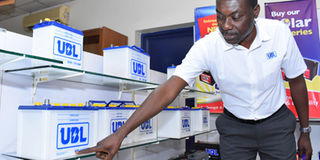‘Homegrown patents will drive us to Middle - Income status’

Uganda Batteries Limited marketing director Moses Zizinga explains the unique features on their product. Inventors should seek protection from the national intellectual property office in this case Uganda Registration Services Bureau. PHOTO BY MICHAEL KAKUMIRIZI
What you need to know:
- Prosper Magazine’s Eronie Kamukama interviewed Ms Mercy Kainobwisho, director intellectual property, Uganda Registration Services Bureau about the patenting process.
Tell us about patents, briefly.
Patents are inventions that have industrial applicability that is they are relevant, are new and have not been done anywhere. They apply in every technical field. They can be for processes, machines or any field of technology.
What is your assessment of Uganda’s patent system?
When it comes to the small and medium enterprises or individuals, we look at research and development institutions mainly. They do a lot of investigation and technological support. We look at universities and there are many potential patents or petty patents called utility models. It is through protection that they can get to the stage of commercialisation.
Normally, these inventors move from creation, prototyping, generation of the intellectual property asset to commercialisation without protection yet it is a very critical stage that gives the person exclusive rights to use.
How does one get the patent?
Uganda has laws that regulate the patents, utility models, industrial designs and technovations. The inventors are always encouraged to seek protection from the national intellectual property office in this case Uganda Registration Services Bureau.
Inventors are also encouraged to do the regional registrations through the Harare Protocol on Patents or the Patent Cooperation Treaty which is regulated and governed by the World Intellectual Property Organisation (WIPO). Uganda is party and signatory to all these treaties.
We have different routes for grant of patents. We have through the Industrial Property Act which was the Patent Act. Since 1992, we have approximately 300 granted patents. Through the Harare Protocol on Patents, we have close to 8000 patents granted.
Through the Patent Cooperation Treaty, we have about 300million patents that are designated in Uganda. The challenge that applicants have is that the patentability criteria is so high that for a government to give you a patent certificate, the patent has to be new. It means whatever process, formula or solution should not have been done anywhere in the World.
Sometimes many people do not meet the novelty criteria. Also, before a patent is granted, it must be industrially applicable which means it must be relevant and able to solve the challenges it has been created for. If it has no purpose, it does not qualify.
Thirdly, it must not be obvious to the person in that field. If you are a biochemist or engineer, that formula or process should not be obvious to any other engineer or inventor in that field.
All these criteria must be met. If you do not meet one of them, then it can be a petty patent or utility model. The qualification is a process but also the other challenge is the cost. An application costs Shs180,000. We then send it for a substantive examination, the grant is about Shs300,000 and publication in the Uganda gazette is about Shs400,000. So, one needs about Shs900,000 to get your pat ent granted. Once you invest in that, the validity is 20 years after which it falls in the public domain.
Another challenge is that institutions do not invest a lot in research and development yet most of these entities have the capacity to create new processes and products. We need innovations hubs and departments within our offices, manufacturing companies and all others involved in providing solutions. The investment is not there and the technical competence is not there. Even the drafting skills for these patent documents are not there.
What are the benefits of getting a patent?
It gives you exclusive ownership so you can use it, license it because the process of licensing has commercial benefits. Whoever uses it without authorisation is infringing and is liable under the law. By providing a solution, you get a market.
You can also use you patent certificate to get a loan in the bank instead of land titles as provided for in the Security Interests in Immovable Property law passed recently. We have so many challenges in our environment that require homegrown solutions and it is these solutions that can be protected as patents nationally, regionally and internationally. They are the ones that will take us to a knowledge economy and to the middle income economy.
Any last remarks?
We have 28 technology and innovation support centres within the country. Inventors can come and get information on all the things that have been done in their field of operation. Sometimes, a person invests in research and comes up with solutions which were given 20 years ago. This helps one to know existing solutions, those that have fallen in the public domain and what the person can improve.



